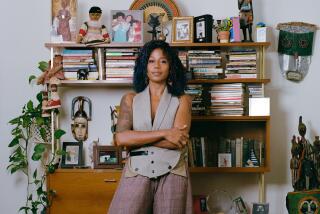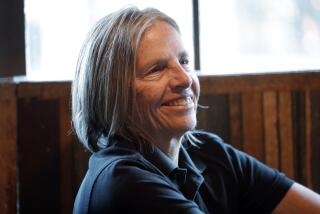Poetry of endless, unfulfilled desire
- Share via
B. H. Fairchild is one of those poets prose readers love: Meaty, maximalist, driven by narrative, he stakes out an American mythos in which the personal and the collective blur. In this, he’s reminiscent of Albert Goldbarth, but whereas Goldbarth often comes back to his own experience, Fairchild is a ventriloquist of a sort.
In “Usher” -- his first collection since the National Book Critics Circle Award-winning “Early Occult Memory Systems of the Lower Midwest” (2002) -- he adopts a variety of voices -- the poet Hart Crane; Rasputin’s daughter, Maria; a seminary student working as a 1950s movie usher -- to evoke a territory between perseverance and despair. “A minister once told me to embrace my sorrow,” recalls the armless, legless circus freak who narrates “Frieda Pushnik.” “To hell with that, I said, embrace your own.” Such a lack of sentimentality infuses “Usher,” an insistence on seeing things as they really are. That’s a vivid and compelling strategy, for at the heart of these poems is the issue of longing, of what we want and yet can never have. For Frieda, it’s a feeling of belonging, “of inscrutable desire . . . that teeming, oozing, / devouring throng borne now into the midway’s sunlight / that vanished, forever silent God to whom I say / again my little prayer: let me be one of them.”
For Crane -- who committed suicide in 1932 by jumping off the ship Orizaba -- it’s more ineffable, the “surge and buffet of what’s always underneath / and untranslatable, crucial, crux of everything, / unresurrected Christ, word, in the beginning / now endeth.” For all of us, it’s a sense of meaning, a desire to be enlarged and ennobled, a desire rendered more profound by the realization that such meaning is ultimately beyond our reach. “There’s your desire, / your want,” Maria Rasputin reflects, “and trust me, it is endless.”
Yes, yes . . . but for all the insistence of such a statement, it is, Fairchild wants us to remember, never quite enough.
--
More to Read
Sign up for our Book Club newsletter
Get the latest news, events and more from the Los Angeles Times Book Club, and help us get L.A. reading and talking.
You may occasionally receive promotional content from the Los Angeles Times.










